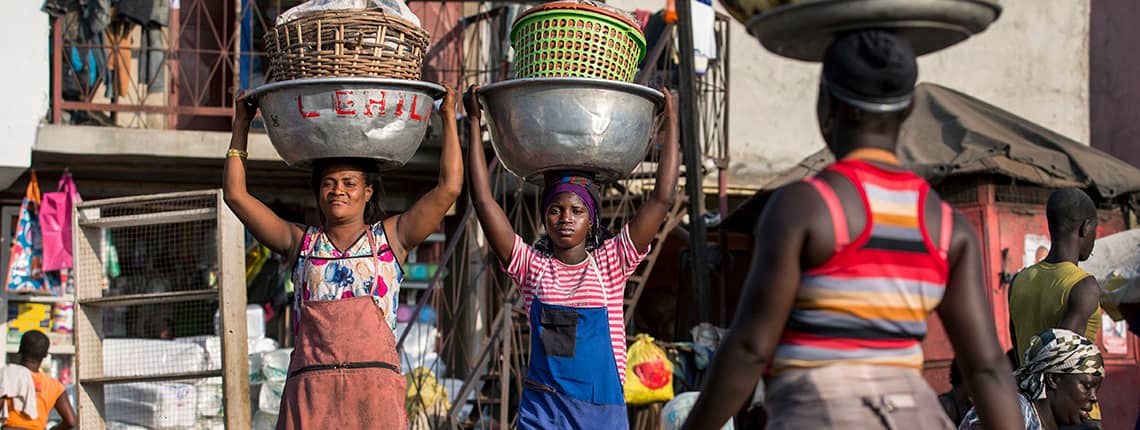Rukaya Bawule is 26 years old and a leader of the kayayei, or headporters, in Agbogbloshie market in Accra, Ghana. Through her organization, the Old Fadama Kayayei Association, Rukaya supports the kayayei during the pandemic by sharing information about the need for PPE and vaccination, and by advocating for their needs with local government.
Most kayayei who work at the market, including Rukaya, are from the country’s rural northern region. They transport heavy loads for market vendors and customers on their heads, often with small children strapped to their backs.
For the kayayei, their full days of work came to an end with the pandemic when customer demand dropped off – exacerbated by government evictions of market areas and stigmatization of the kayayei as carriers of disease. “The market is not busy because of COVID-19 and they have relocated some parts of the Agbogbloshie market, so we don’t have access to our customers.”
Since then, money has been scarce – many kayayei have had to skip meals to make ends meet. Some, including Rukaya, saw no other solution but to send their children to relatives back home, unsure how they would be able to feed them.
“I sent my two-year-old son home due to COVID-19 because I felt Accra could be dangerous for him. With my mum, he will receive good care.”
A central demand for the kayayei association is for safe, affordable and accessible child care close to the markets where they work.
“Our concern is mainly about our children. We would prefer to take them to childcare centers near or in the market while we work so that we pick them up afterwards. This will enable us to work effectively.”
Rather than support the kayayei through the crisis with access to necessary social protections and cash relief, government actions such as harassment and evictions of market areas have inflicted additional harm on their livelihoods.
“The city guards have started harassing us…Politicians remember us during elections, they come to us for our votes. But after elections they maltreat us and sack us from where we work.”
In the absence of government support, kayayei have developed strategies to support each other, for example by sharing meals and child care responsibilities. Kayayei leaders like Rukaya continue to do what they can to support their members, including modeling consistent PPE use and inspiring confidence in vaccination: “That’s why I have gone for the vaccine so that I can use it to convince them to get vaccinated.”
Kayayei are advocating with their government for the structural change they need to recover from the crisis and secure safe and sustainable livelihoods. Important are the provision of social protection including child care, elimination of harassment, and access to training, finance and additional employment opportunities.
“We are creating a database to enable us to effectively advocate for our needs from Social Welfare and the Gender Ministry. With the database, we can confidently quote our numbers when we are asked.”
“Some of the girls want to further their education but they don’t have the means. Others are eager to learn a trade. Some of us would like to start a business. If they make loans available, we can work and pay back. This support will enable us to take care of our children. It will be very great if the government can assist us with this.”
* This story is based on an interview with Rukaya Bawule for round 2 of WIEGO’s COVID-19 Crisis and the Informal Economy Study, conducted in August 2021. It was published with Rukaya’s consent. Read more on COVID-19 recovery in Accra here.
